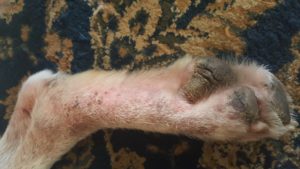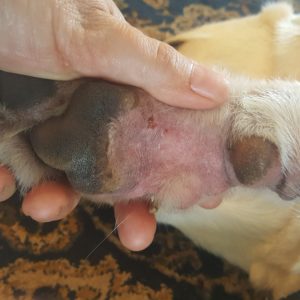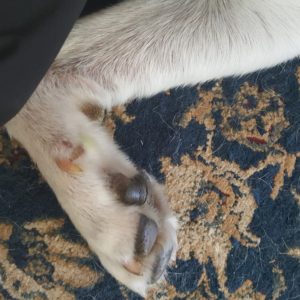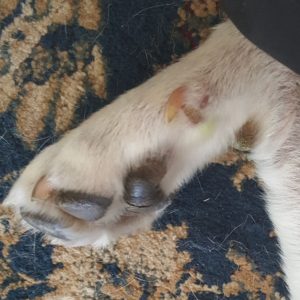3 Year Old Yellow Labrador Retriever with Severe Itchy Paws Healed
Allergies Caused Severe Itchiness for this Sweet Dog
Doc Truli looked into the eyes of the sweetest Yellow Labrador Retriever as Ruthie’s mom held her harness to keep her from jumping on “company.” You see, Doc Truli is a house call veterinarian. Gone are the nerves and shyness of the animal hospital, Ruthie wanted to play! The bouncy yellow rubber ball (and a light coating of drool) just glided out of Ruthie’s mouth onto the ceramic tile by the front door. She broke free and 4-paw hopped backward into the open living room to wait to catch the ball. That’s when the sunlight came through the back sliders facing the canal and dad’s boat dock and highlighted the paw problem.
Do you see what I see?
Bright pink, dry, bald skin with yellow color change on skin and paw pads. Cracked paw pads. Patches of scab and crust with open sores oozing blood. The skin felt flame hot and slightly sticky. The paw pads were warm and dry and rough. The cracked areas were hard and dry. Ruthie is such a sweet dog, she just laid there and let Doc Truli examine each toe even though her feet hurt.

All 4 legs looked bald, red, oozed blood and hurt and itched like crazy! Look at those cracked pads!
“We tried everything.”
Ruthie’s family practically could have bought a room at the animal hospital! They had skin testing, allergy testing, steroids, antihistamines, antibiotics, shampoos, hypoallergenic prescription food, omega-3 fatty acids, probiotics.
Does this sound familiar?
There was one medicine that seemed to help. It was an FDA-approved patent medicine for allergies and atopic dermatitis in dogs. Ruthie was only slightly helped with the itch symptoms. The fur did not grow back on her legs.
“The neighbors stop and ask us what is the matter with her legs. We’re afraid they think we’re bad dog parents.”
“We called you for advice on how to cook for her and any other ideas you might have from your holistic training.”
Integrative Medicine to the Rescue
What on Earth is Integrative Medicine supposed to mean?
Integrative Medicine combines scientifically-validated medicine and techniques (like surgery) with options considered outside the current ‘norm’ of Western biomedicine, like acupuncture, nutrition therapy, herbal medicine, etc.
Principles of integrative medicine can be adapted to veterinary medicine:
- A partnership between the client and the veterinarian
- Consideration of all factors that influence health, wellness, disease – including emotional, physical and behavioral needs of the species
- Use of biomedical and “alternative” methods to facilitate the body’s innate healing response
- Appropriate consideration given to use of less-invasive and less-harmful interventions, when possible, while addressing the whole patient in addition to the disease.
- The concept that medicine is based on good science, is inquiry-driven and open to critical consideration of new paradigms
Successful Allergy Treatment for this Yellow Lab
In consultation with Ruthie’s humans, a plan that included balanced home-cooked meals, herbal medicine, and effective pharmaceuticals was implemented. We chose food for biomedical properties to enhance healing and support healthy immune response. We also selected food based on Traditional Chinese Medicine principles of action in the body. Ruthie took herbal formulas designed to synergize the herbs into a powerful medicine to bring relief to those paws. We submitted new regional allergy testing and ordered allergy desensitization drops for Ruthie to take for 5 to 18 months to treat her grass allergies. We also selected a pharmaceutical medicine that temporarily calmed her symptoms for comfort sake. We gave her monthly acupuncture treatments that calmed her itchiness, cooled her down and helped her start healing. Finally, we recommitted to the value of a good, basic medicated shampoo – with appropriate contact time- to allow the meds to work properly. This family especially needed help putting this workable, effective plan together.
These results look pretty good- do they not?






My lab is in terrible shape due to allergies right now